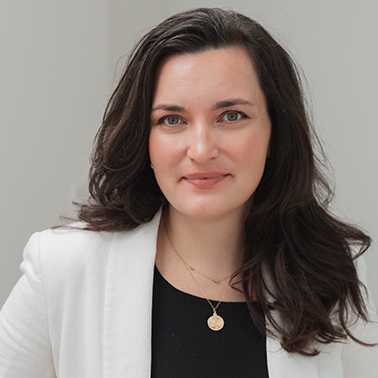
Dr. Anna MacKinnon, Hopital Sainte-Justine Exploring epigenetic and neural mechanisms underlying development in children born during the COVID-19 pandemic
Dr. Anna MacKinnon is an Assistant Professor in the Department of Psychiatry and Addiction at the Université de Montréal and an FRQS Research-Scholar (Junior 1) at the CHU Sainte-Justine Research Centre. She completed her PhD in Clinical Psychology at McGill University and pursued postdoctoral training at the University of Calgary, where she gained expertise in large-scale cohort studies and the development and evaluation of interventions for pregnant individuals and parents. Her program of research focuses on perinatal mental health and the intergenerational transmission of stress, integrating neuroimaging, epigenetics, and developmental psychology. Her SickKids New Investigator Grant supports a sub-study within the Pregnancy during the COVID-19 Pandemic (PdP) cohort, which will be conducted at the newly established Centre IMAGINE pediatric imaging research facility at CHU Sainte-Justine. This project aims to identify epigenetic and neural biomarkers—specifically DNA methylation in oxytocin-related genes and brain connectivity patterns—that link prenatal distress during the pandemic to early childhood developmental outcomes. The findings will inform early identification strategies and targeted interventions for children at risk of sychopathology.

Dr. Brett Trost, The Hospital for Sick Children Combining genome and transcriptome data to better understand the genetic etiology of autism spectrum disorder
Dr. Brett Trost is a Scientist in the Molecular Medicine Program at The Hospital for Sick Children (SickKids) and an Assistant Professor in the Department of Molecular Genetics at the University of Toronto. He received his Ph.D. in Computer Science from the University of Saskatchewan, where he applied computational and statistical methods to study phosphorylation-mediated cellular signaling. He then completed a postdoctoral fellowship in Dr. Stephen Scherer’s lab at SickKids, using genome sequencing data to better understand the genetic etiology of autism. Since establishing his independent laboratory at SickKids in 2023, Dr. Trost has focused on developing and applying methods that integrate multi-omics data with machine learning to elucidate the genetics of neurodevelopmental and psychiatric conditions. Dr. Trost’s New Investigator Research Grant will support the development of methods for using genome sequencing and RNA-seq data from approximately 2,000 families with autism to learn more about how non-coding genetic variants contribute to autism susceptibility.

Dr. Danielle Whittier, University of Calgary Investigating the impact of childhood obesity on fracture risk and healing using advanced medical imaging
Dr. Danielle Whittier is an Assistant Professor at the University of Calgary, and Tier 2 Canadian Research Chair in Pediatric Musculoskeletal Imaging. Dr Whittier received her PhD in Biomedical Engineering at the University of Calgary (2016-2021), then trained in the Institute for Biomechanics at ETH Zurich in Switzerland for her postdoctoral fellowship (2021-2023) with a joint affiliation in the Department of Osteoporosis, University of Bern. Dr Whittier’s research program leverages high-resolution 3D medical imaging and computational modelling techniques to study bone adaptation and fracture healing in adolescents with the aim of better understanding the underlying mechanisms that lead to suboptimal skeletal health among children impacted by chronic diseases.

Dr. Mauro Sergio Batista Da Silva, Universite Laval Investigating the Amygdala’s Kiss: How Early-Life Obesity Shapes Pubertal Development
Dr. Mauro Silva is an Assistant Professor at Université Laval, having joined the Department of Obstetrics, Gynecology, and Reproduction in September 2024. He holds a Bachelor’s degree in Biological Sciences and a Master’s degree in Physiology from the Federal University of Minas Gerais (UFMG, Brazil), which included a CAPES/FIPSE research internship at Wake Forest University (USA). Dr. Silva earned his PhD in Physiology/Neurosciences from the University of Otago (New Zealand), where he specialized in neuroendocrinology under the supervision of Dr. Rebecca Campbell. His postdoctoral experience comprises research with Dr. Paolo Giacobini and Dr. Vincent Prevot at the French National Institute of Health and Medical Research (INSERM, France), as well as work with Dr. Victor Navarro at Harvard Medical School (USA). At Université Laval, Dr. Silva’s research focuses on investigating the mechanisms that govern neuroendocrine regulation of reproductive development and health. Through his New Investigator Research Grant, Dr. Silva will examine how early-life high-fat diet consumption negatively impacts infant neurodevelopment, puberty, and reproductive maturation.

Tamara Taillieu, The University of Manitoba A population-based cohort study on adolescent substance use: Adverse childhood experiences, protective factors, and longer-term health and social outcomes
Dr. Tamara Taillieu is an Assistant Professor in the College of Community and Global Health at the University of Manitoba, and a Research Scientist at the Manitoba Centre for Health Policy. Dr. Taillieu’s overarching program of research focuses on child maltreatment, intimate partner violence, and other forms of trauma on physical and mental health across the lifespan, with a particular emphasis on substance use. With the New Investigator Research Award, Dr. Taillieu will examine trajectories of adolescent substance use by linking population-based self-reported adolescent survey data (school-based census data) to population-based administrative data (education, health, social services, justice). The adolescent self-reported survey data contains information on risk factors, protective factors, and social determinants of health indicators that are not available in administrative data. A substantial strength of the administrative data is that adolescents can be followed both forward (long-term outcomes) and backward (risk factors preceding substance use onset) in time. This approach is both innovative and original and will fill critical gaps in the literature by generating new knowledge on the risk and protective factors and longer-term outcomes of adolescent substance use across multiple developmental domains.

Dr. Tieghan Killackey, University Health Network iCanCope CardioVascular Surgery (iCC CVS): Co-design and evaluation of a smartphone-based self-management program for youth undergoing cardiovascular surgery
Dr. Tieghan Killackey is an Assistant Professor in the Lawrence Bloomberg Faculty of Nursing and holds the RBC Financial Group Chair in Cardiovascular Nursing Research at the Peter Munk Cardiac Centre, University Health Network and the Bloomberg Faculty of Nursing, University of Toronto. Dr. Killackey earned her doctorate at the University of Toronto (2020), with specialized training in bioethics and qualitative health research methodology, and then went on to complete postdoctoral training at the Hospital for Sick Children (SickKids) Research Institute (2020-2023). Dr. Killackey is a Certified Cardiovascular Nurse, and her research program uses qualitative and mixed-methods to improve patient and family experiences with cardiovascular care across the lifespan, with specific emphasis on enhancing autonomy and supporting self-management for youth and young adults using technology. With the New Investigator Research Grant, Dr. Killackey will co-design and evaluate a smartphone-based self-management program for youth undergoing cardiovascular surgery.


